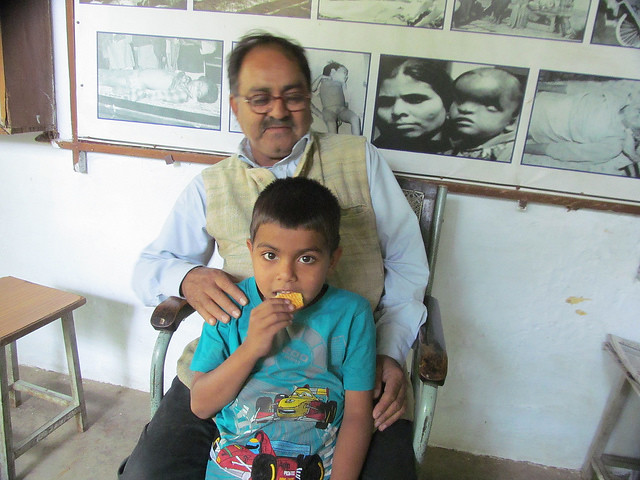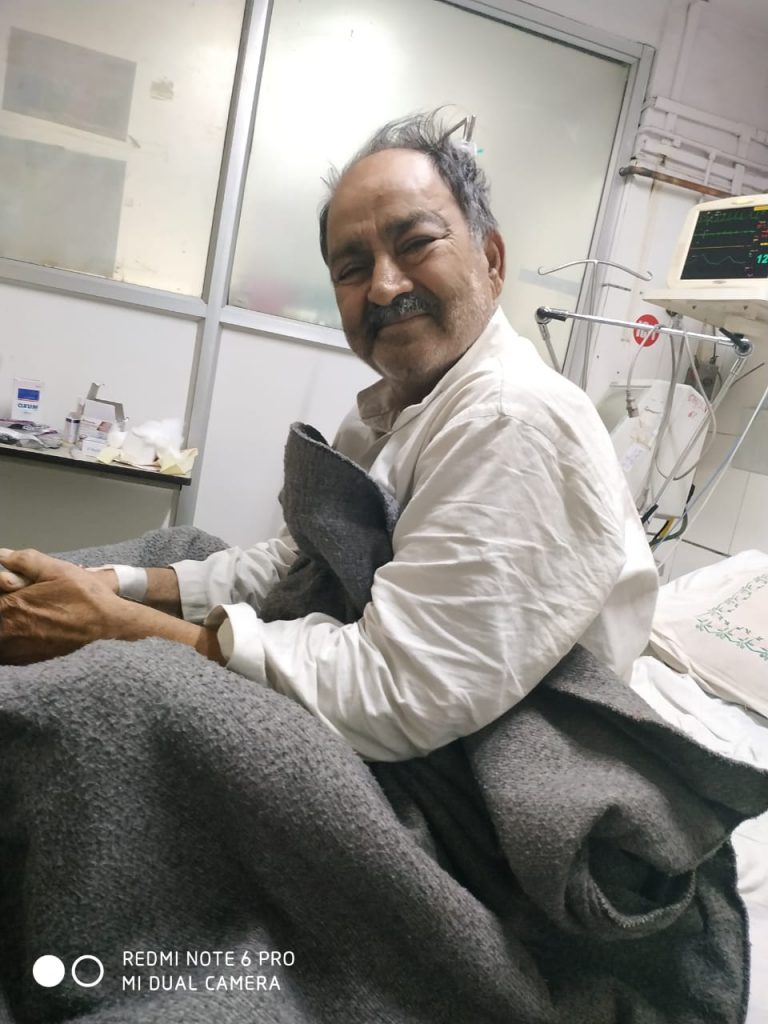Abdul Jabbar, the voice of Bhopal Gas tragedy victims, is no more

By Anuj Srivastava, TwoCircles.net
Abdul Jabbar, 62, who struggled for over three decades to bring justice to the victims of the Bhopal gas tragedy, passed away on Thursday after a prolonged illness. He was the convener of NGO working in the interest of Bhopal gas victims. He was earlier admitted to a hospital in Bhopal for treatment.
Died of a heart attack
Dr Abbas, who was treating Abdul Jabbar, told the media that Jabbar was a diabetic and heart patient. He suffered a heart attack twice on Thursday night, the first at 9 pm and the second time at around 10 pm. According to Jabbar's family, he also had gangrene, due to which the toes were damaged. The family members got him admitted in Kamala Nehru Hospital two months ago. There, the doctors advised cutting his fingers. As his health wasn’t improving at the Kamla Nehru hospital, he was brought to BMHRC. His condition was not improving there either. A week ago, he had been admitted to a private hospital.
He needed better treatment but our system does not intend to improve government hospitals for the treatment of the common man. Battling financial hardship, Jabbar's family was unable to take him to any reputed private hospital. Finally, on Thursday night the voice of lakhs of victims of the Bhopal gas tragedy went quiet.

Abdul Jaffar in the hospital
By the time the Government acted, it was too late
Some social workers and their friends teamed up on social media to raise the money for treatment. The Madhya Pradesh government also came into action due to this social media campaign. On Thursday, Chief Minister Kamal Nath also tweeted about the cost of his treatment, but it was too late. Former Chief Minister Digvijay Singh also paid a visit to the hospital to meet Jabbar.
Abdul Jabbar's parents were among the thousands of people who died in the Bhopal gas tragedy. Nand Kashyap, a social activist from Chhattisgarh, remembers the time of the tragedy, stating that “people were not allowed to go to that area for a few weeks after the gas scandal. After about a month, I reached there with some medicines to help the victims. People used to talk about a 20-year-old young man who stood at the forefront of helping the victims… that young man was Abdul Jabbar.” Jabbar continued to struggle for the victims of this tragedy for the rest of his life. Jabbar himself was also one of the victims of the gas tragedy. Exposure to gas leakage had a serious effect on his lungs and eyes. He suffered an extreme loss of sight in one of his eyes.
"Jabbar was a very affable person," said Kaldas Daharia of Chhattisgarh Mukti Morcha. “Anyone who met him would end up his friend. The people in the neighbourhood were reluctant to go near and help the victims of the tragedy but Jabbar bhai attended and helped everyone to the fullest. His door was always open for every needy," he said. He added that the poison of (looking at everything through the lens of) Hindu-Muslim which is seeping in the society today had no effect in the Jabbar’s organization, where all were equals.
On the night of December 2, 1984, poisonous gas, methyl isocyanate, leaked from the Union Carbide factory in Bhopal. Poisonous gas was spreading quickly in the air. More than 30 tons of poisonous gas leaked. The catastrophe was so devastating that people died whichever way the wind turned. About three thousand people died that night. The total number of deaths due to gas was estimated to be between 15,000-20,000. Lakhs of people were affected by the incident.
The area where Jabbar lived in Rajendra Nagar Street in Bhopal is just one and a half kilometres from the Union Carbide factory. That night he was at home with his mother. Suddenly, the health of the people sleeping in the house began to deteriorate. Not just with one or two people, that was what was happening all over the neighbourhood. People were at a loss to grasp what was going on. People were facing difficulty in breathing. Jabbar got his mother on his scooter and took her to safety someplace 40 kilometres away and returned to the poison-infested hometown to help others. When he returned, the scene was heart-wrenching, people died while sleeping, some were groaning and suffering fro agonizing pain in the streets. A construction company worker employed to plant borewells, Abdul Jabbar got initiated that night only to carry on with the same zeal until the last moments (of his life).
The Slogan “ख़ैरात नहीं रोजगार चाहिए (Give us work, Not Charity)”
In 1987, Jabbar established the Bhopal Gas Victims women's Industry Organisation. The organization mainly fought for widowed women who lost their husbands in the tragedy. The struggle escalated and in 1989, compensation was announced to the gas victims. Then a swabhiman (self-respect) centre was established, in which women were thought sewing and embroidery so that these women could live their lives with self-esteem. About 5,000 women have benefited from this. Compensation is not Justice, even if one ignores that not everyone got compensated and that the compensation was inadequate.
With the slogan of ‘ख़ैरात नहीं रोजगार चाहिए’ (Give us work, not charity), the gas victims led by Abdul Jabbar had sent nearly 20,000 postcards to the Prime Minister Narendra Modi. It is a shame that the Government of India could not bring back the Chairman of Union Carbide, before his death, to India to face justice to the gas victims.
Through his NGO, Jabbar helped the families of the victims and helped their words reach the government. His organization fought for justice for the victims, survivors and their families. Time and again, he also demonstrated against the government demanding not only demanded allowances and compensation, especially for widows who lost their loved ones but also demanded employment.
Culprits yet to be punished
In 1988, Jabbar's organization got its first success when the Supreme Court spoke of giving alimony to the victims. Thereafter, in 1989, an agreement between the Government of India and the Union Carbide decided that Rs 25,000 would be paid to the victims and Rs 1 lakh rupees to the families of the deceased. Thereafter, the injured got Rs 25,000 on Prorata and the relatives of the dead got an extra Rs 1 lakh. Due to the efforts of his organization, in 2010, the Chief Judicial Magistrate's Court of Bhopal sentenced union carbide officers to two years each, but this sentence is yet to be implemented.
Recalling Abdul Jabbar, his friend Badal Saroj wrote, "I have earned countless companions and comrades...those who can be blindly trusted. But friends are few, even less in Bhopal, Jabbar Bhai is one of them. Friends are those who communicate without vocalising, friends are those whose mere thought fills your heart with joy, friends are those sitting with whom you feel powered up with courage, the heart and the mind is filled with freshness, friends mean that it becomes difficult to decide whether affection between them weighs more or the mutual respect, friend means alter ego. Jabbar is our friend and we are each other’s alter ego."
Badal says, "Bhopal has given many intelligent personalities and belligerent fighters. I could only know about them thanks to my father. But I got the opportunity to see and meet some of them. However, Jabbar Bhai is a Struggle-Made icon. He is the symbol of the public-struggles of Bhopal over the last half-century, not just with union carbide saga, but a vigilant and rigorous warrior against every type of poisonous wind – a Glorious Bhopali."
Recounting the first meeting with Jabbar, Badal recalls that " I first met him alongside the departed comrade Shaili in December 1992 (after the Babri Masjid demolition) when a small team of Digvijay Singh, Shelly, Ramprakash Tripathi, Hardenia ji, etc., were busy extinguishing the communal fire engulfing Bhopal. Jabbar bhai was the most active and foundational component of that effort. His last message came the day before, he asked to meet to express his gratitude for my cooperation. He conveyed that his recovery is on track. We are so used to pushing everything that I postponed my visit to the hospital for today."
The passing away of (this) man alone can leave Bhopal, a city with a glorious legacy, poor and lonely. The silence of a single voice can also create a frightening silence, which has engulfed Bhopal for the last two days.
